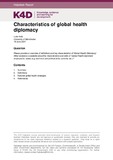| dc.contributor.author | Kelly, Luke | |
| dc.coverage.spatial | China | en |
| dc.date.accessioned | 2021-07-12T10:55:17Z | |
| dc.date.available | 2021-07-12T10:55:17Z | |
| dc.date.issued | 2021-06-18 | |
| dc.identifier.citation | Kelly, L. (2021). Characteristics of global health diplomacy. K4D Helpdesk Report. Institute of Development Studies. DOI:10.19088/K4D.2021.092 | en |
| dc.identifier.uri | https://opendocs.ids.ac.uk/opendocs/handle/20.500.12413/16733 | |
| dc.description.abstract | This rapid review focuses on Global Health Diplomacy and defines it as a method of interaction between the different stakeholders of the public health sector in a bid to promote representation, cooperation, promotion of the right to health and improvement of health systems for vulnerable populations on a global scale. It is the link between health and international relations. GHD has various actors including states, intergovernmental organizations, private companies, public-private partnerships and non-governmental organizations. Foreign policies can be integrated into national health in various ways i.e., designing institutions to govern practices regarding health diplomacy (i.e., health and foreign affairs ministries), creating and promoting norms and ideas that support foreign policy integration and promoting policies that deal with specific issues affecting the different actors in the GHD arena to encourage states to integrate them into their national health strategies. GHD is classified into core diplomacy – where there are bilateral and multilateral negotiations which may lead to binding agreements, multistakeholder diplomacy – where there are multilateral and bilateral negotiations which do not lead to binding agreements and informal diplomacy – which are interactions between other actors in the public health sector i.e., NGOs and Intergovernmental Organizations. The US National Security Strategy of 2010 highlighted the matters to be considered while drafting a health strategy as: the prevalence of the disease, the potential of the state to treat the disease and the value of affected areas. The UK Government Strategy found the drivers of health strategies to be self-interest (protecting security and economic interests of the state), enhancing the UK’s reputation, and focusing on global health to help others. The report views health diplomacy as a field which requires expertise from different disciplines, especially in the field of foreign policy and public health. The lack of diplomatic expertise and health expertise have been cited as barriers to integrating health into foreign policies. States and other actors should collaborate to promote the right to health globally. | en |
| dc.description.sponsorship | FCDO (Foreign, Commonwealth and Development Office) | en |
| dc.language.iso | en | en |
| dc.publisher | Institute of Development Studies | en |
| dc.relation.ispartofseries | K4D Helpdesk Report;1021 | |
| dc.rights.uri | https://www.nationalarchives.gov.uk/doc/open-government-licence/version/3/ | en |
| dc.subject | Globalisation | en |
| dc.subject | Health | en |
| dc.subject | Rights | en |
| dc.title | Characteristics of Global Health Diplomacy | en |
| dc.type | Helpdesk | en |
| dc.rights.holder | © Crown copyright 2021 | en |
| dc.identifier.doi | 10.19088/K4D.2021.092 | |
| dcterms.dateAccepted | 2021-06-18 | |
| rioxxterms.funder | Default funder | en |
| rioxxterms.identifier.project | Default project | en |
| rioxxterms.version | VoR | en |
| rioxxterms.versionofrecord | 10.19088/K4D.2021.092 | en |
| rioxxterms.funder.project | 9ce4e4dc-26e9-4d78-96e9-15e4dcac0642 | en |

